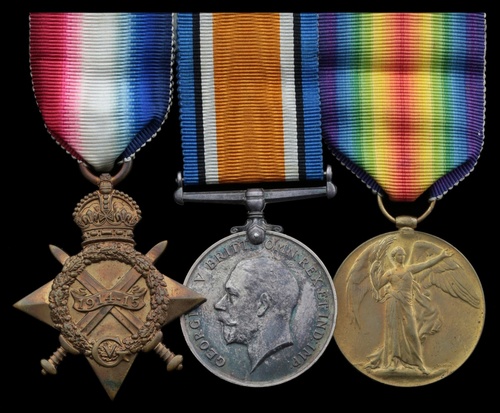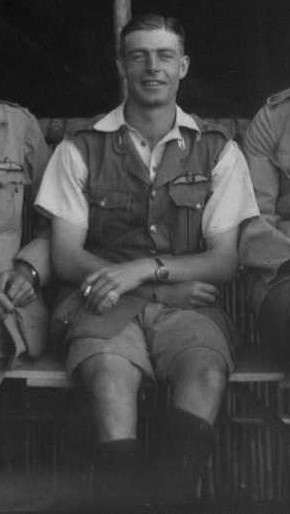Auction: 22103 - Orders, Decorations and Medals VII - e-Auction
Lot: 440
Three: Captain R. E. Eversen, Royal Air Force, late Royal Flying Corps and Suffolk Yeomanry, who saw Gallipoli service with the Infantry and Palestinian and East African service with the R.F.C. before having his career cut tragically short when he was shot by a friendly sentry at Ekaterinodar, South Russia on 15 August 1919, making him quite possibly the first member of the Royal Air Force killed in South Russia
1914-15 Star (2. Lieut. R. E. Eversden. Suff. Yeo.); British War and Victory Medals (Capt. R. E. Eversden. R.A.F.), mounted as worn, good very fine (3)
Provenance:
D.N.W. June 1994.
Robert Ernest Eversden was born at Islington, London on 19 December 1894, the son of Alonzo and Catherine Eversden. Young Eversden's father died when he was only two and his mother supported the pair until he grew old enough to work. At sixteen he was an Apprentice Journalist in Islington. Joining the Buckinghamshire Yeomanry as a Trooper in 1911 he was commissioned into the 15th (Suffolk Yeomanry) Battalion, Suffolk Regiment on 3 December 1914.
Posted to the M.E.F. on 25 September 1915 the Battalion sailed from Liverpool aboard the S.S. Olympic arriving at Mudros in early October from which they joined the war in Gallipoli that same month. Here Eversden excelled, apparently acting as a sniper due to his shooting ability. Evacuated to Egypt at the end of the Campaign he was promoted Captain on 1 June 1916. Eversden was attached to the Royal Air Force that same day and, after a stint as an instructor in Egypt, he saw service with No 45 Squadron in Palestine. Transferring officially to the Royal Air Force on 12 January 1917. He wrote to his mother from the Levant describing the scene:
'A mile or so from the camp an ancient tower stretches leanly up from its surrounding bed of olive trees. It is a relic of the brave Crusader and bears upon its breast the effigy of St. George. How amazed the armoured saint must be to see, after all these centuries, British soldiers sweating past, marching on towards his Master's Tomb.'
In the same letter he goes on to describe the darker side of the war over the desert
'Now, isn't all this ridiculous! I'm relapsing into my old sentimentality. Me! The cold-blooded me who races up after the poor unfortunate Hun! He (the Hun) is getting such a thick time here, dear. We shot one down yesterday. Shot his observer in cold blood and then shot off one of his planes, and then his fuselage- like a boy picking off flies' legs one by one!!'
Numerous after action reports note a good deal of attacks on the withdrawing Ottoman army, notably strafing marching columns and railway stations. Joining 147 Squadron in Palestine he later saw East African Service from May 1917. At one stage during this service he had to make a forced landing on the Mlali Road, not realising that it was waterlogged at the time. As often happened in damp regions in East Africa this led to an attack of fever which- according the war diary- saw him 'looked after in an outlying farm'. Fortunately, unlike so many of his contemporaries in that part of the world, Eversden was able to shake off his illness. The rest of his time here was spent reconnoitring enemy columns, bombing such positions as could be found and delivering messages between the Allied Columns.
At the end of the war Eversden volunteered for Russian service and was posted to No. 47 Squadron. Sent to South Russia to join General Dentkin's forces Eversden was one of the pilot's sent to train Russian pilots to fly against the Red Air Force. Eversden was one of several officers living in a railway yard near Ekaterinodar, camped in tents some way from the yard they were keeping their possessions within the railway cars. One evening Eversden returned to the yard to collect some personal items and, while crawling under a carriage he was shot by a sentry and killed instantly at 08:20 in the morning on 15 August 1919.
It was noted in the War Diary that Eversden elected not to reply when challenged by the sentry and that there appeared to be little reason for him to be crawling under the train carriage. It was further noted that the sentries had been fired at three times that night by 'persons unknown' and were doubtless jumpy as a result. While other members of the R.A.F. had sustained injury at this stage in South Russia it appears that Eversen was the first to be killed. Due to the Peculiarities of his service, Eversen is commemorated upon the Haidar Pasha Memorial; sold together with an archive of copied research including war diary entries, action reports and newspaper articles as well as service papers, typed and handwritten research along with M.I.C., former auction listings and letters.
Subject to 20% VAT on Buyer’s Premium. For more information please view Terms and Conditions for Buyers.
Sold for
£800
Starting price
£110







